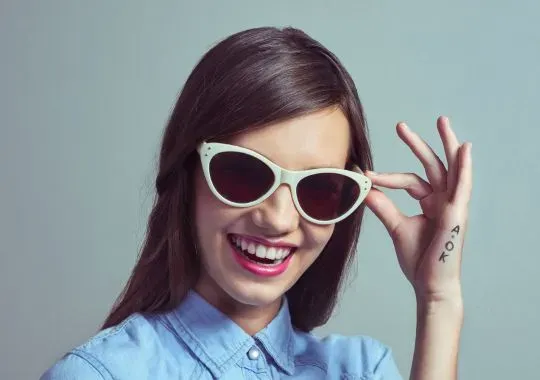Sunglasses are a popular accessory that can be both stylish and functional. They protect your eyes from harmful UV rays and glare, making them a must-have for any outdoor activity. But how long do good sunglasses last? It's a common question among sunglasses wearers, and the answer may surprise you. In this article, we'll explore the factors that affect the lifespan of sunglasses and provide tips on how to care for them to ensure they last as long as possible.
As Amazon affiliates we may earn a commission if you purchase a product at no cost to you.
How Long Do Sunglasses Last?
Sunglasses are a popular accessory that not only protect your eyes from harmful UV rays but also add a touch of style to your outfit. But like any other accessory, sunglasses have a lifespan. In this section, we will discuss how long sunglasses typically last and the factors that affect their lifespan.
Factors Affecting Sunglasses' Lifespan
Several factors can affect how long your sunglasses last. Here are some of the most common ones:
- Quality: The quality of your sunglasses plays a significant role in how long they last. High-quality sunglasses made with durable materials are likely to last longer than cheap, low-quality sunglasses.
- Usage: How often you wear your sunglasses and how you handle them can also affect their lifespan. If you wear your sunglasses every day and toss them around carelessly, they may not last as long as if you wear them occasionally and store them properly.
- Environmental factors: Exposure to extreme temperatures, humidity, and saltwater can also affect the lifespan of your sunglasses. If you live in a hot and humid climate or spend a lot of time near the ocean, your sunglasses may not last as long as if you live in a cooler, drier climate.
Signs That Your Sunglasses Need To Be Replaced
Even if you take good care of your sunglasses, they will eventually wear out. Here are some signs that it's time to replace your sunglasses:
- Scratches: If your lenses are scratched, it can affect your vision and make it difficult to see clearly. While you can try to buff out minor scratches, deep scratches may require you to replace your lenses or your entire pair of sunglasses.
- Loose or broken frames: If your frames are loose or broken, your sunglasses may not fit properly and may not provide adequate protection from the sun's harmful UV rays.
- Faded lenses: Over time, the color of your lenses may fade, making it difficult to see clearly. If you notice that your lenses are significantly faded, it may be time to replace them.
In general, sunglasses can last anywhere from a few months to several years, depending on the factors mentioned above. While there is no set expiration date for sunglasses, it's essential to replace them when they show signs of wear and tear to ensure that you're getting the best protection for your eyes.

Sunglasses' Protection
When it comes to sunglasses, protection is key. Not only do they protect your eyes from harmful UV rays, but they also reduce glare and improve visibility. Here are some important factors to consider when it comes to sunglasses' protection.
UV Protection
One of the most important aspects of sunglasses' protection is their ability to block UV rays. UV rays can cause damage to your eyes and skin, and prolonged exposure can lead to serious health issues. Look for sunglasses that offer 100% UV protection, which means they block both UVA and UVB rays. Some sunglasses may also offer protection up to 400nm, which is the maximum amount of UV absorption.
Polarized Lenses
Polarized lenses are another important factor to consider when it comes to sunglasses' protection. They work by reducing glare from reflective surfaces, such as water or snow. This can be especially helpful for outdoor activities like fishing or skiing. However, it's important to note that polarized lenses do not offer any additional UV protection.
Lens Coatings
Lens coatings can also play a role in sunglasses' protection. For example, some lenses may have a UV coating that helps to block UV rays. Others may have a scratch-resistant coating, which can help to improve their durability and strength. Some lenses may also be photochromic, which means they adjust to different lighting conditions.
Sunglasses' Style
When it comes to sunglasses, style is just as important as functionality. The right pair of sunglasses can elevate your outfit and protect your eyes from harmful UV rays. Here are some factors to consider when choosing the style of your sunglasses.
Frame Size and Shape
The size and shape of your sunglasses frame can greatly affect how they look on your face. Larger frames are trendy and can provide more coverage for your eyes, while smaller frames can be more classic and timeless. Wraparound styles are also popular for their sporty look and added sun protection.
Color and Darkness of the Lens
The color and darkness of your sunglasses lens can also impact the style and functionality of your sunglasses. Darker lenses can provide more protection from the sun, but may not be suitable for low-light conditions. Different lens colors can also affect how you perceive colors and contrast.
Brand Quality
Choosing a high-quality brand for your sunglasses can ensure that they last longer and provide better protection for your eyes. Look for brands that have a reputation for durability and UV protection.
Sunglasses' Maintenance and Care
Tips for Maintaining Sunglasses
To ensure that your sunglasses last long, you need to take care of them properly. Here are some tips to help you maintain your sunglasses:
- Always store your sunglasses in a case when you are not wearing them.
- Clean your sunglasses regularly with a microfiber cloth to remove dirt and smudges.
- Avoid using paper towels or clothing to clean your sunglasses, as they can scratch the lenses.
- Use a lens cleaner specifically designed for sunglasses to remove any stubborn dirt or smudges.
- Avoid leaving your sunglasses in a hot car or exposing them to extreme temperatures, as this can damage the lenses.
How to Test Sunglasses' Efficacy
It is important to test your sunglasses to ensure that they provide adequate protection from the sun's harmful rays. Here's how to test your sunglasses' efficacy:
- Look for sunglasses that provide 100% UV protection.
- Hold your sunglasses up to a bright light source, such as the sun or a lamp, and look through the lenses. If you can see through the lenses, they are not effective at blocking UV rays.
- Check the label or packaging of your sunglasses to ensure that they meet the American National Standards Institute (ANSI) UV protection requirements.
How to Protect Sunglasses from Scratches
Scratches can damage the lenses of your sunglasses and affect their efficacy. Here are some tips to help you protect your sunglasses from scratches:
- Avoid placing your sunglasses face down on hard surfaces.
- Use a protective case to store your sunglasses when you are not wearing them.
- Avoid cleaning your sunglasses with abrasive materials or harsh chemicals.
- Use a microfiber cloth to clean your sunglasses, as it is gentle on the lenses.

Sunglasses and Eye Health
The Importance of Regular Eye Exams
Regular eye exams are essential for maintaining good eye health. An eye exam can help detect eye diseases, such as cataracts, before they become a major problem. During a comprehensive eye exam, an eye doctor can also check for signs of eye strain and other vision problems. It is recommended to have a comprehensive eye exam at least once every two years, or more frequently if you have a history of eye diseases or vision problems.
The Link Between Sunglasses and Eye Diseases
Sunglasses are an important tool in protecting your eyes from harmful UV rays. Exposure to UV rays can increase your risk of developing eye diseases such as cataracts and macular degeneration. It is important to choose sunglasses that block 100% of both UVA and UVB rays. Polarized lenses can also help reduce glare and improve visual clarity.
Recommended Article

Conclusion
Wearing sunglasses can also help reduce eye strain and fatigue. When you are exposed to bright sunlight, your eyes have to work harder to adjust to the light. This can cause eye strain, headaches, and fatigue. Wearing sunglasses can help reduce the amount of light that enters your eyes, making it easier for your eyes to adjust to the light.










